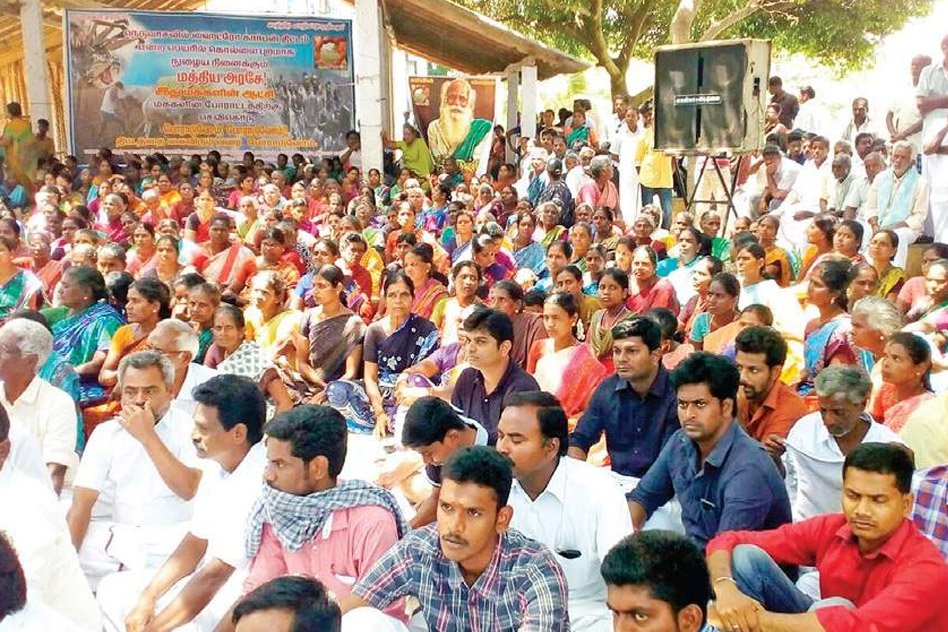
Tamil Nadu: Villagers & Environmentalists Protest Neduvasal Hydrocarbon Extraction Project
27 Feb 2017 7:20 AM GMT
On February 15, 2017, the Cabinet Committee on Economic Affairs approved a contract which involved 44 fields to the Oil and Natural Gas Corporation (ONGC) and Oil India Limited (OIL). Two of these areas fall in Tamil Nadu and Pondicherry: Neduvasal, a village in Pudukottai District in Tamil Nadu, and Karaikkal, a region in the Union Territory of Pondicherry. The contracts were for hydrocarbon exploration and extraction.
Since the announcement of the project, the villagers have been up in arms against it. They have intensified protests against the project – which the ONGC awarded to a private company. Environmental activists have joined hands with the villagers to oppose the hydrocarbon extraction project.
What are hydrocarbons?
Hydrocarbon are compounds which contain hydrogen and carbon. They have high calorific value and can be used as fuel.
India and hydrocarbons
India doesn’t have many hydrocarbon reserves. So we buy them from other countries – India currently imports around 75% of its energy requirements.
In September 2016, the government had announced plans to reduce its hydrocarbon imports by 10% by 2022; this was to be done by increasing domestic output, fuel efficiency, and the use of alternative energy.
In 2009, the ONGC, during exploration in several places, found hydrocarbon in form of shale gas in Tamil Nadu’s Neduvasal village.
How does shale extraction usually work?
Shale oil extraction is a process of oil extraction and production. It is usually performed above ground by mining the oil shale and then treating it in processing facilities. Other modern technologies perform the processing underground by applying heat and extracting the oil via oil wells.
Shale extraction can be done by fracking. Fracking is the process of injecting liquid at high pressure into subterranean rocks, boreholes, etc., to force open existing fissures and extract oil or gas.
What are the concerns of the villagers and environmentalists?
Farmers fear that the project will damage the agricultural land. The region is part of the Kaveri delta, a highly productive agricultural zone.
Other concerns include the relocation of locals and negative effects on their livelihood.
The shale oil extraction process utilises a lot of water and sand. Given Tamil Nadu’s existing water crisis, this has raised concerns over further depletion of resources.
Fracking as a process – when used in shale oil extraction and in general as well – can have devastating effects on the environment. The potential environmental impacts of fracking include air emissions and climate change, high water consumption, water contamination, land use, risk of earthquakes, noise pollution, and adverse health effects. Air emissions are primarily methane (a greenhouse gas) that escapes from wells, along with industrial emissions from equipment used in the extraction process.
Shale oil extraction by fracking has been banned in many parts of the world – like Scotland and Vermont. Some other parts, like South Africa and the United Kingdom, have resorted to strict regulation of fracking to counter its negative effects.
The Tamil Nadu government had banned shale extraction in 2015. However, the project has raised possibilities about the return of shale extraction.
The Logical Indian take
The concerns raised by the locals and the activists are valid and deserve to be addressed immediately. The government should take into account the impact the project will have on the rural economy and the environment. In case the government decides to greenlight the project, the relocation and rehabilitation of the villagers should be meticulously planned and executed.
At the same time, the safety of the villagers and the environment should be the top priority. The government could study other oil wells in the area which have been built in the past decade to assess the effects.
 All section
All section













